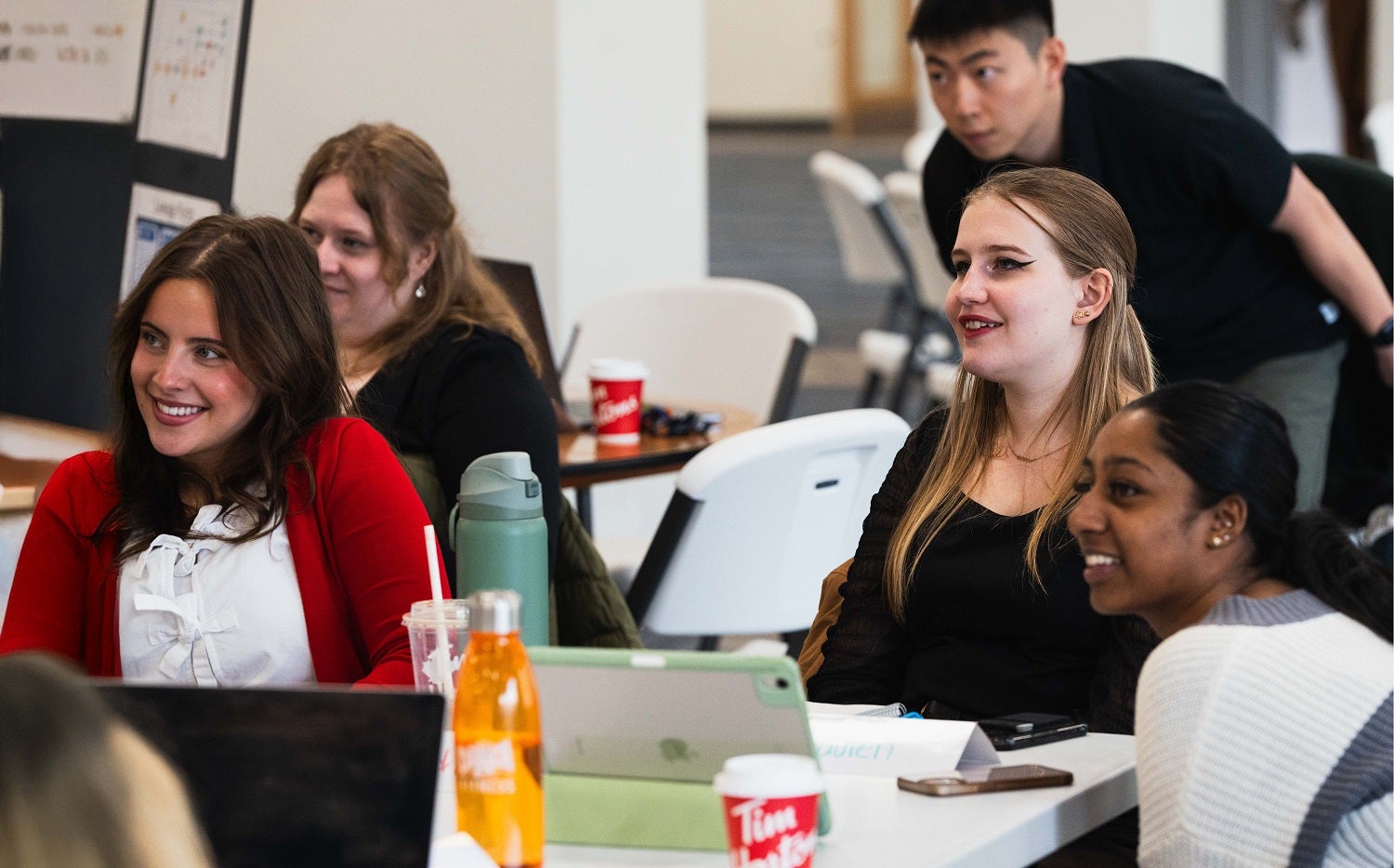
Students and locals reimagine economic and social future
Community engaged classrooms are empowering students and local changemakers in Waterloo Region to co-create real-world solutions for sustainable, people- and planet-centered economic systems

Community engaged classrooms are empowering students and local changemakers in Waterloo Region to co-create real-world solutions for sustainable, people- and planet-centered economic systems
By Chantal Vallis Faculty of EnvironmentIn a classroom that feels more like a brainstorming lab than a lecture hall, students at the University of Waterloo are diving into the complexities of local economic systems—agriculture, waste management, housing, and small business development— to find real-world interventions that can make a difference in our local community. But they aren’t doing it alone.
Our local Waterloo Region community has played an active part. Non-profits, municipal governments, community organizers and business owners have been a key force in this community engaged classroom. Together they have mapped out what’s working and not working on these complex issues and used each other’s expertise to reimagine how they could operate for the benefit of people and planet.
“A lot of community work is action oriented,” says Jen Gordon, Manager of the Region of Waterloo’s Plan to End Chronic Homelessness. “We rarely have time to step back, look at the big picture, and do conceptual, theoretical thinking. This course provides that opportunity. It transports me out of my own footprint and into a bigger collective story.”
The course, ENBUS 314: Sustainable Business Models, is offered in the Faculty of Environment and open to all undergraduate and graduate students hoping to learn the necessary critical thinking and problem-solving skills necessary to tackle whole-of-society issues.
For Lauren Stone, an Environment and Business student, this experience has been eye-opening. “Understanding local economic systems where we can intervene, specific to Waterloo, has been valuable. It makes me question every system that I am in.”
“I like the real-world connection. I want better alternatives to the challenges that we are facing,” says Nicole Jeyanathan, another Environment and Business student in the course. Her sentiment is shared by many of her peers, who appreciate the chance to think beyond textbooks and into solutions that could shape their own neighborhoods.

Lauren Stone, Madi Moniz and Nicole Jeyanathan tackled agriculture in Waterloo Region. They are exploring how to better connect students with local food systems.
But the impact isn’t just one-sided. Local organizations involved in the course are just as excited to learn from the students. “It gets us as an organization engaged at new levels and challenges us to think in different ways,” says Josalyn Radcliffe from The Food System Roundtable of Waterloo Region. “Seeing how young people approach these issues is very inspiring and hopeful.”
This back-and-forth dialogue—between students eager to create change and community members with on-the-ground experience—is at the heart of the course’s success.
“We don’t see learning as confined to the classroom or to students,” explains Sean Geobey, professor in the Faculty of Environment and course instructor. “With a model like this, students can learn directly from the community they are in and community members are given an opportunity to reflect on their work with our students. Indeed, we as a university can learn how to be more engaged community members ourselves.”
Ultimately, this course is more than just a learning experience—it’s a testing ground for new ideas, a place where students and community members work together to challenge assumptions, reimagine spaces, and take meaningful steps toward better systems. And with every conversation, every prototype, and every insight shared, they’re building a future where change doesn’t just stay in the classroom—it becomes a part of the world around them.



Read more
Celebrating professors from across the University for their support and guidance of graduate students

Read more
Aidan Iapicco receives the Environment Student-Athlete Award in recognition of excelling in sport and studies

Read more
City of Kitchener partners with United College's GreenHouse to drive youth-led climate action with $64,000 in microgrants from Bloomberg Philanthropies
The University of Waterloo acknowledges that much of our work takes place on the traditional territory of the Neutral, Anishinaabeg, and Haudenosaunee peoples. Our main campus is situated on the Haldimand Tract, the land granted to the Six Nations that includes six miles on each side of the Grand River. Our active work toward reconciliation takes place across our campuses through research, learning, teaching, and community building, and is co-ordinated within the Office of Indigenous Relations.